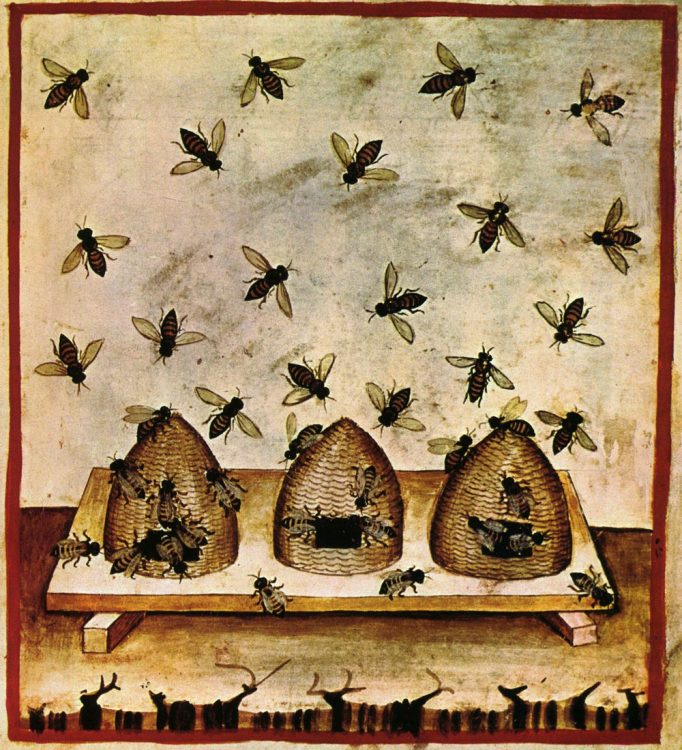In Praise of Bees
Medieval writers often saw in animals reflections of their own qualities and characteristics. Some beasts could be noble, while others treacherous. One particular creature that often got admiration was the bee.

Bees depicted in Tacuina sanitatis, a 14th century manuscript
In the year 1240 the scholar Bartholomeus Anglicus completed his work De proprietatibus rerum ("On the Properties of Things"), a type of encyclopedia that offered information on wide variety of topics. In his section on Birds and Fishes, Bartholomeus includes a few paragraphs about bees, and he clearly finds many good things to say about them. In fact, his account can be seen as example of how a medieval society should operate, including the proper qualities of kings and knights. After noting how they "are wonderful noble and worthy," Bartholomeus gives these details about them:
Bees make among them a king, and ordain among them common people. And though they be put and set under a king, yet they are free and love their king that they make, by kind love, and defend him with full great defence, and hold it an honour and worship to perish and be spilt for their king, and do their king so great worship that none of them dare go out of their house, nor to get meat, but if the king pass out and take the principality of flight. And bees chose to their king him that is most worthy and noble in highness and fairness, and most clear in mildness, for that is chief virtue in a king. For though their king have a sting yet he uses it not in wreck. And also bees that are disobedient to the king, they deem themselves by their own doom for to die by the wound of their own sting. And of a swarm of bees is none idle. Some fight, as it were in battle, in the field against other bees, some are busy about meat, and some watch the coming of showers. And some behold concourse and meting of dues, and some make wax of flowers, and some make cells now round, now square with wonder binding and joining, and evenness. And yet nevertheless, among so diverse works none of them doth espy nor wait to take out of other's travail, neither taketh wrongfully, neither steals meat, but each seeks and gathers by his own flight and travail among herbs and flowers that are good and convenable.
Bees sit not on fruit but on flowers, not withered but fresh and new, and gather matter of the which they make both honey and wax. And when the flowers that are nigh unto them be spent, then they send spies for to espy meat in further places. And if the night falls upon them in their journey, then they lie upright to defend their wings from rain, and from dew, that they may in the morrow tide fly the more swifter to their work with their wings dry and able to fly. And they ordain watches after the manner of castles, and rest all night until it be day, till one bee wake them all with twice buzzing or thrice, or with some manner trumping; then they fly all, if the day be fair on the morrow. And the bees that bring and bear what is needful, dread blasts of wind, and fly therefore low by the ground when they be charged, lest they be letted with some manner of blasts, and charge themselves sometimes with gravel or with small stones, that they may be the more stedfast against blasts of wind by heaviness of the stones.
The obedience of bees is wonderful about the king, for when he passes forth, all the swarm in one cluster passes with him. And he is beclipped about with the swarm, as it were with an host of knights. And he is barely seen that time for the multitude that follows and serves him, and when the people of bees are in travail, he is within, and as it were governor, and goes about to comfort others for to work. And only he is not bound to travail. And all about him are certain bees with stings, as it were champions, and continual wardens of the king's body. And he seldom goes out, but when he does all the swarm shall go out. His outgoing is known certain days before by voice of the host, as it were arraying itself to pass out with the king.
You can read an English translation of De proprietatibus rerum in Mediaeval Lore from Bartholomew Anglicus by Robert Steele, which is available from Project Gutenberg.
Medieval people also quite liked honey. To find out how this product was very useful in wartime, check out "The sweet side of war: Honey and military medicine" by Ilana Krug, in Medieval Warfare, Vol.VIII:2.
